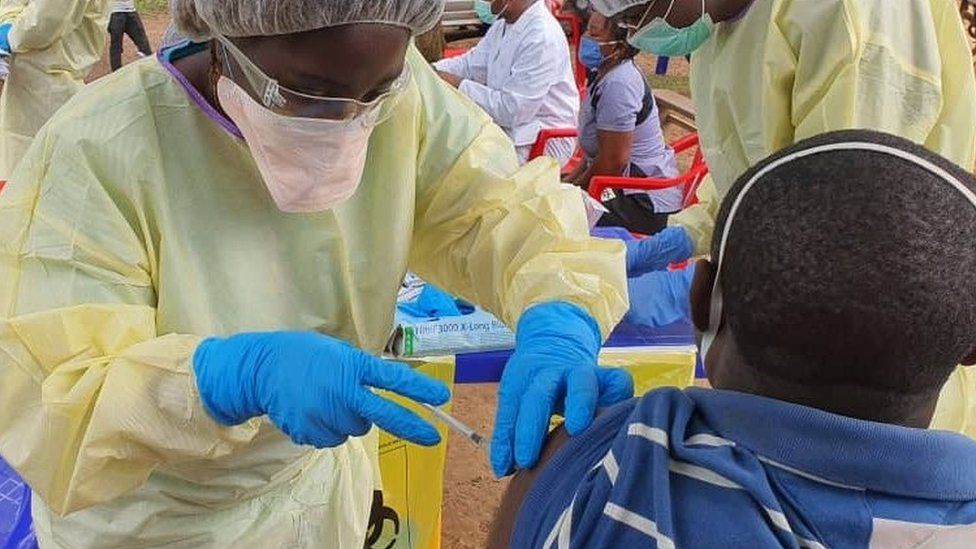The Democratic Republic of Congo (DRC) is set to commence its long-anticipated mpox vaccination campaign on October 2, almost a week ahead of its initial schedule. The expedited timeline was confirmed on Wednesday by Cris Kacita, the head of the country’s mpox outbreak response team, following new developments that accelerated the process.
As the epicenter of the ongoing global mpox outbreak, the DRC faces immense pressure to curb the spread of the virus. The World Health Organization (WHO) recently classified the outbreak as a global public health emergency. However, the country’s vaccination efforts have been hampered by a severe shortage of available vaccines, posing a significant obstacle to combatting the virus effectively.
Initially, the vaccination campaign was slated for October 8, following the arrival of the first consignment of mpox vaccine doses. However, in a strategic move to mitigate further spread, authorities are pushing forward with the rollout. “There are procedures that have evolved and helped reduce delays,” Kacita told Reuters, signaling a much-needed breakthrough in the logistical efforts to launch the campaign early.
The vaccination drive, set to last 10 days, will specifically target adults in six provinces severely affected by the outbreak. Among the prioritized groups for vaccination are healthcare professionals, park rangers, and sex workers—individuals considered to be at a higher risk of contracting and transmitting the virus.
In a country as vast and logistically complex as the DRC, the vaccination effort is expected to encounter significant hurdles, particularly in reaching remote areas. Covering a landmass nearly the size of Western Europe, the logistics of delivering vaccines to distant and often inaccessible regions pose a considerable challenge. Despite this, Kacita remains optimistic, assuring that preparations are underway to ensure that vaccines reach the most vulnerable populations.
Beyond logistics, another key challenge lies in overcoming public mistrust toward the vaccine. Health officials have acknowledged a lingering wariness in certain communities, which stems from a combination of misinformation and historical skepticism towards medical interventions. Kacita and his team are working diligently to educate communities about the safety and efficacy of the vaccine to build confidence in the immunization efforts.
The DRC’s vaccination campaign is bolstered by the recent delivery of 50,000 mpox vaccine doses from the United States, a contribution confirmed by U.S. Ambassador Lucy Tamlyn via X (formerly Twitter). In total, the central African country has received 265,000 vaccine doses from both the United States and the European Union. Despite this support, Kacita cautioned that the available doses would still be insufficient to cover the vast areas in need of immunization.
To further enhance the campaign, the DRC has received additional promises of vaccine donations from France and Belgium. “There have been promises from France and Belgium, and the number of doses is expected to be known within the week,” Kacita stated, underscoring the importance of international collaboration in the fight against mpox.
Adding to these efforts, Japan has committed to donating 3.5 million doses of a child-friendly mpox vaccine, aimed at one of the most vulnerable groups—children. Discussions are still ongoing, but this donation is expected to provide significant relief as children have been identified as one of the primary victims of the virus.
The expedited launch of the vaccination campaign comes at a critical moment, as the DRC seeks to contain the outbreak and prevent further fatalities. Mpox, a sometimes deadly virus, has spread rapidly across the country, with healthcare workers on the frontlines bearing the brunt of the crisis.
The DRC’s mpox response is being closely monitored by global health organizations, and the success of the vaccination campaign will serve as a crucial measure of the country’s ability to manage the outbreak. While the early launch is a positive development, the long-term success of the vaccination program will depend on continued international support and effective coordination within the country.
As the vaccination campaign begins on October 2, healthcare workers, park rangers, and other high-risk groups will receive the first doses, marking a pivotal step in the DRC’s fight against mpox. Yet, the road ahead remains challenging, with the country still facing significant hurdles in terms of logistics, vaccine supply, and public trust.
The international community continues to rally behind the DRC in its efforts to contain the virus, but the battle against mpox is far from over. The early start of the vaccination campaign may provide a crucial advantage, but sustained efforts will be required to ensure the safety of millions in the region and beyond.



